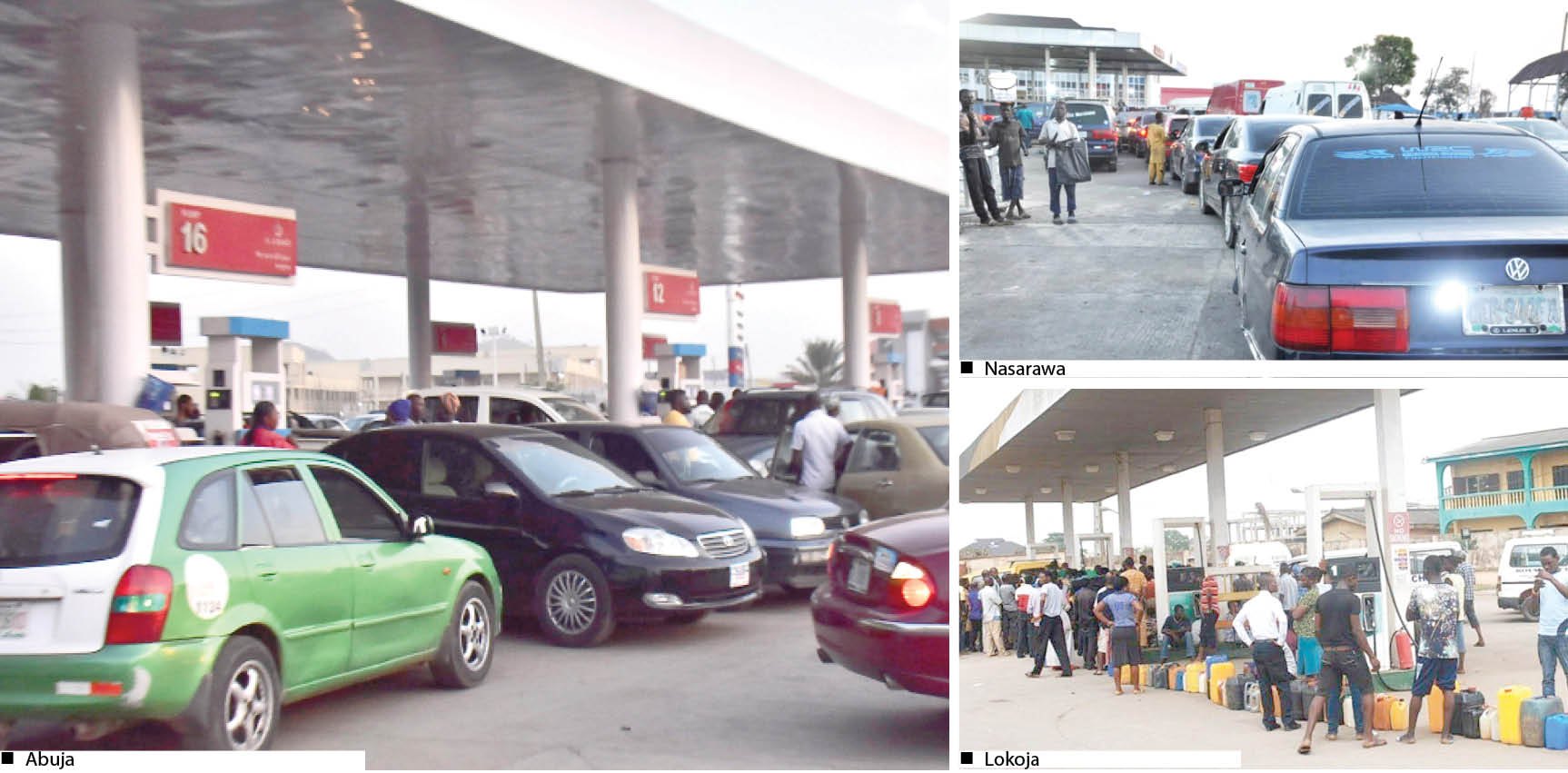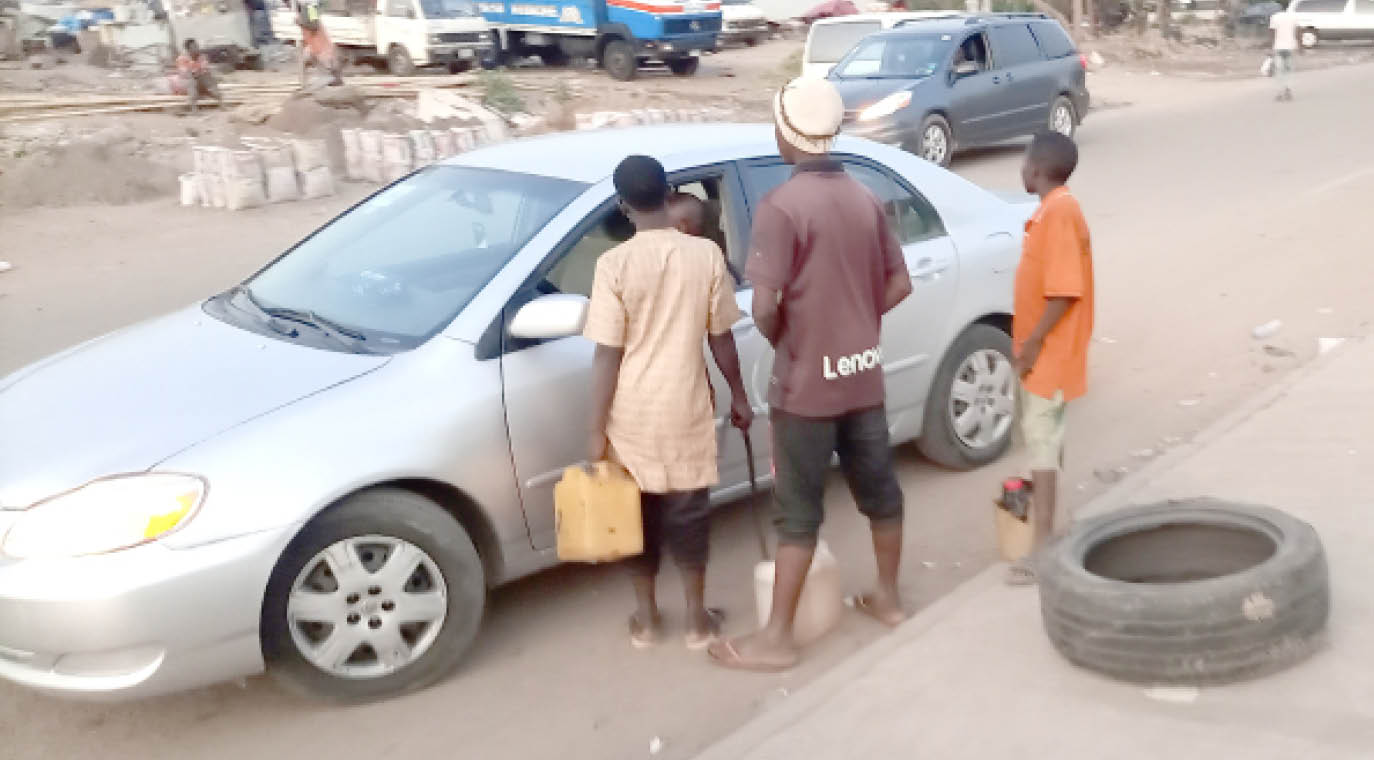48 days after, Buhari’s c’ttee fails to end petrol scarcity
Forty-eight days after, a 14-man steering committee constituted to tackle petrol supply hurdles and regulate the price of the product, under the chairmanship of President Muhammadu Buhari, has failed to end the scarcity. Reports from our correspondents showed that the scarcity of the product has worsened in states with motorists buying a litre for N300. […]

48 days after, Buhari’s c’ttee fails to end petrol scarcity
Forty-eight days after, a 14-man steering committee constituted to tackle petrol supply hurdles and regulate the price of the product, under the chairmanship of President Muhammadu Buhari, has failed to end the scarcity.
Reports from our correspondents showed that the scarcity of the product has worsened in states with motorists buying a litre for N300.
Credible sources in the petroleum industry, however, confirmed to this paper that the president is yet to inaugurate the panel, which is raising concerns in the country.
Daily Trust reached out to the Minister of State for Petroleum Resources, Timipre Sylva, who was to superintend the committee headed by Buhari himself, but he could not be reached.
- NIGERIA DAILY: What The President Elect Should Do To Earn The Trust Of Nigerians
- CITAD seeks domestication of VAPP Act
Officials at NNPC Limited, a strong member of the committee and the sole importer of petrol, did not immediately respond to this paper’s enquiries.
A top official told this paper that industry players are keen on the inauguration of the committee but that has not been done.
“We were keen to see that the committee is inaugurated and running but that has not been done. What happened was that heads of relevant agencies tried to deepen actions to solve the problem,” said the official.
Also speaking, another regulatory official said the president may have been told that the relevant agencies could handle the situation and there was no need for the committee.
Scarcity worsens across states
The situation in states across the federation has continued to worsen as Nigerians look forward to a lasting solution.
Motorists in Kano said although fuel is now more readily available compared to late last year, the price is still high at private fuel stations. They also lamented difficulties in getting fuel after joining queues in the petrol stations, as a result of the cash crunch.
Malam Labaran Ibrahim, a commercial bus driver said: “We normally sacrifice a whole day to get fuel at either N210 or N220. That is how we can get something to pay our balance and feed our families. We join the queue where we think or confirm fuel will be sold the following day. We normally join in the evening and stay there until the next day,” he lamented.
In Kaduna, a businesswoman, Fatima Raji, said in the past three months, she had been buying petrol at between N300 and N350 per litre.
“The situation has not improved. I buy from Future View, a filling station near Command Secondary School, Kaduna, at N300. It has not changed. When the committee was announced, we thought it would address the problem of scarcity. Unfortunately, it has not,” she said.
The Managing Partner, ABOPE Chambers, Barr. Femi Aborisade, said the perennial rise in fuel prices and the NNPC factor are nothing but a policy to rob the masses of their little earnings for the benefit of dealers in the oil sector.

We patronise private depots at N240/litre – IPMAN
The Kaduna Unit of the Independent Petroleum Marketers Association of Nigeria (IPMAN) has faulted the federal government’s inability to keep the nation’s refineries functional as being responsible for the lingering scarcity of Premium Motor Spirit (PMS) also known as petrol.
The IPMAN chairman in Kaduna, Alhaji Abdulfatah Murtala, while speaking on phone with our correspondent in Kaduna, said instead of buying petrol from the federal government at N171 per litre, they have been forced to patronise private depots and buy at N240 per litre.
Murtala, who is also the managing director of Yussufa Petroleum and Gas Company, said IPMAN members opted to buy petrol from private depots because it takes months to load the product when they bought from the government.
“The problem of petrol scarcity is solely from the federal government and not IPMAN. The government sells the product to us at N171 per litre but before we can load the product, it takes between one and three months. That is why we opt to buy the product from private depots at N240 per litre.
“To transport the product from the deport in the southern part of the country to the North, we spend more than N2 million and if you add that to other costs at the deport before loading, the price of the product would be N295 per litre. That is why the product is sold above N300 per litre by many independent marketers,” he said.
FG spends N2.4trn subsidy in 6 months
Despite the huge amount of money spent on petrol subsidy, the acute scarcity of the product has continued for nearly two years and worsened in the past six months with over N2.4 trillion believed to have been spent to subsidize the product, Daily Trust reports.
In February 2023, the Group Chief Executive Officer of NNPC Ltd, Mele Kyari, said about N400 billion is spent to subsidise petrol every month which is about N202 per litre of petrol. At that amount, Nigeria would have spent N2.4 trillion as a subsidy on petrol to keep the official rate at N124/l.
However, more stations sell the product at N200-N600 per litre, thereby defeating the purpose of the subsidy.
Breaking down the cost of importing the petrol, Kyari had said, the landing cost of imported petrol was N315 per litre but that NNPC transferred it to the marketers (depots) at N113 per litre.
“Today, by law and the provisions of the Appropriation Act, there is a subsidy on the supply of petroleum products, particularly PMS, into our country. In current data terms, three days ago the landing cost was around N315/litre.”
“Our customers are here, we are transferring to each of them at N113/litre. That means there’s a difference of close to N202 for every litre of PMS we import into this country.
“In computation, N202 multiplied by 66.5 million litres, multiplied by 30 will give you over N400bn of subsidy every month. There is a budget for this but it is also a drain on our funds.
“It is a strain on the cash flow of our company when you don’t get a refund from the ministry of finance. But we will continue to support the country and provide energy security to the country,” Kyari stated.
In its latest update on petrol availability in Nigeria last week, NNPC said there are 2.1 billion litres of PMS in stock, representing 0.9 billion litres in all the land depots nationwide and 1.2 billion litres on marine vessels, which is equivalent to 35 days sufficiency as of March 4, 2023. NNPC also said it plans to close March 2023 with about 2.8 billion litres, which is equivalent to 47 days of sufficiency.
Subsidy not getting to Nigerians – NASME
Chairman of the Nigerian Association of Small and Medium Enterprises (NASME), Lagos Chapter, Dr. Adams Adebayo, said the subsidy not getting to ordinary Nigerians.
According to him, many filling stations are buying fuel from other sources in addition to the high cost of logistics.
“This is the fault of the government that is not regulating it. I have said so many times that subsidy is a scam.
“If you want to subsidise and you want people to be okay, you subsidise exactly what people are consuming daily,” he said.
Why Buhari raised committee
On January 24, Sylva, in a statement, announced the constitution of a 14-man steering committee to enforce petroleum products supply and compliance with official prices.
The committee has the President and Minister of Petroleum, Muhammadu Buhari as chairman and the Minister of State as alternate chairman. It is expected to ensure stock management and visibility on the NNPC Limited refineries rehabilitation and track daily distribution to tackle smuggling.
That would be the first time the minister of petroleum and Nigeria’s president will be directly chairing a committee in the petroleum industry and Nigerians had expected so much action, which has not happened, with the committee not even ready to operate, according to sources.
“The campaign and election activities overwhelmed the president. That was why he may not have made time to inaugurate the committee,” another source said. The minister had directed NMDPRA to ensure strict compliance with the government-approved ex-depot and retail petrol prices.
It directed NMDPRA to ensure that NNPC Limited, which is the sole supplier, meets the domestic supply obligation of petrol and other petroleum products in the country.
“The federal government will not allow misguided elements to bring untold hardship upon the citizenry and attempt to discredit the government’s efforts in consolidating the gains made thus far in the oil and gas sector of the economy,” it stated.
Other members are the Minister of Finance, Permanent Secretary, petroleum ministry, National Economic Adviser to the President, DSS, Customs, EFCC, NSCDC, NMDPRA, CBN, and NNPC.
We stand by NNPC’s explanation – Presidency
When contacted, the Presidency said the explanation given by the Nigeria National Petroleum Company Limited (NNPC Ltd) over the current development was enough.
By Simon E. Sunday, Muideen Olaniyi (Abuja), Zahraddeen Y. Shuaibu (Kano), Jide Olasunkanmi, Abdullateef Aliyu (Lagos) & Maryam Ahmadu-Suka (Kaduna)
